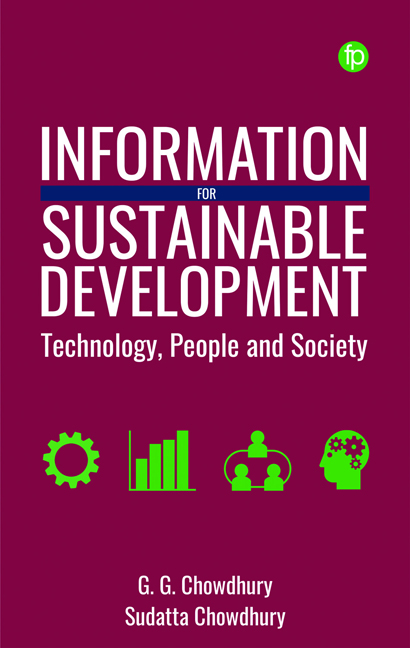Book contents
- Frontmatter
- Dedication
- Contents
- Figures
- Tables
- About the Authors
- Introduction
- 1 Data, Information, People and Society
- 2 Information and the Sustainable Development Goals
- 3 Sustainable Development Goals: Targets and Indicators
- 4 Data, Information and Progress in SDGs
- 5 Capacity, Co-operation and Sharing of Data for SDGs
- 6 People and the SDGs: the Digital Divide
- 7 People and the SDGs: Access to Data and Digital Skills
- 8 Information Skills and the SDGs in Everyday Life
- 9 Information, Education and Sustainable Development
- 10 Research and Development Around the SDGs
- 11 Information Education, Research and Professional Developments Around SDGs
- References
- Index
7 - People and the SDGs: Access to Data and Digital Skills
Published online by Cambridge University Press: 13 April 2024
- Frontmatter
- Dedication
- Contents
- Figures
- Tables
- About the Authors
- Introduction
- 1 Data, Information, People and Society
- 2 Information and the Sustainable Development Goals
- 3 Sustainable Development Goals: Targets and Indicators
- 4 Data, Information and Progress in SDGs
- 5 Capacity, Co-operation and Sharing of Data for SDGs
- 6 People and the SDGs: the Digital Divide
- 7 People and the SDGs: Access to Data and Digital Skills
- 8 Information Skills and the SDGs in Everyday Life
- 9 Information, Education and Sustainable Development
- 10 Research and Development Around the SDGs
- 11 Information Education, Research and Professional Developments Around SDGs
- References
- Index
Summary
Introduction
‘The SDGs are meant to improve the lives of individuals, protect the planet and help ensure a prosperous future for all. In summary, the SDGs are meant to protect the interest of the public’ (Vargas and Lee, 2023, 25). Many people in today's digital age have access to data; however, all citizens should have access to the relevant data and information for their learning, living, citizenship and so on. Therefore, everyone in society should not only have access to information and communication technologies (ICTs) and the internet, but they should also have the proper skills to navigate, access and use information. It echoes with the United Nation's 2030 Agenda, which focuses on several communication and information issues: ‘SDG5 highlights the importance of Information and Communication Technologies (ICTs) as tools for women's empowerment, while SDG9 promotes universal internet access. ICTs are also mentioned in SDG4 and SDG17. SDG16 calls attention to the importance of access to public information legislation and to the imperative of protecting journalists, trade unionists, and human rights defenders’ (Vargas and Lee, 2023, 27).
As discussed in Chapter 6, it is widely recognised that access to adequate ICTs in general, and access to the internet in particular, is a prerequisite for access to data and information. However, access to the ICT or the internet alone cannot ensure that people are able to find and meaningfully use the data and information in the appropriate context of their living, learning, work and myriad other activities and events that take place in today's digital society. To make appropriate use of ICTs and the internet for accessing data and information, people need to acquire a set of digital skills. This chapter discusses what constitutes digital skills, and how they impact people's life, employment, work, health, etc.; and, more importantly, what digital skills mean in the context of the SDGs.
Digital literacy and digital skills
‘The concept of digital literacy has been defined in numerous ways over the last two decades to incorporate rapid technological changes, its versatility, and to bridge the global digital divide’ (Radovanović et al., 2020, 151). Generally speaking, digital literacy, or digital skills, is the set of skills or competencies required for optimum access to, and use of, ICTs in general, and the internet in particular, for communications, access, management, and use of information.
- Type
- Chapter
- Information
- Information for Sustainable DevelopmentTechnology, People and Society, pp. 117 - 134Publisher: FacetPrint publication year: 2024

